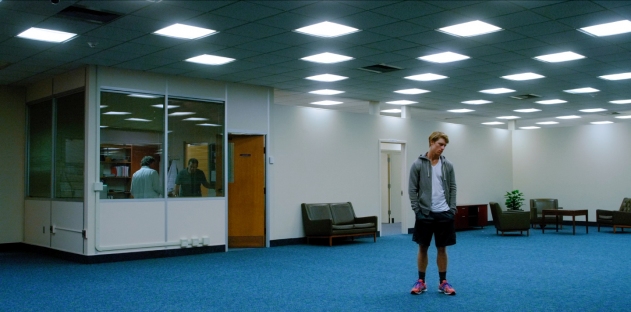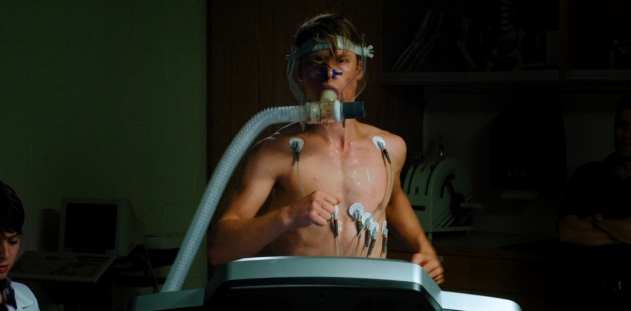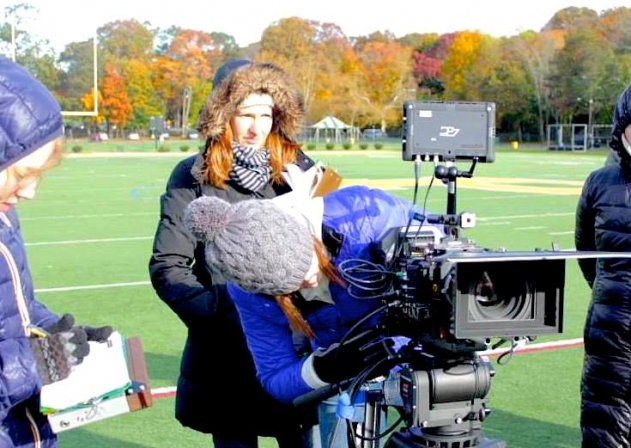
Sexual victimization of men is talked about much less frequently than that of women. Anna Gutto’s short film A LUCKY MAN takes on the subject. Supported by a grant from the Alfred P. Sloan Foundation's partnership with Columbia University, Gutto worked with Dr. Carol Ewing Garber on the physiology of arousal as explained in the film. Science & Film sat down with Gutto at Museum of the Moving Image.
Science & Film: What is A LUCKY MAN about, and why were you interested in telling this story?
Anna Gutto: I believe that consent is an issue that is relevant across gender lines, and may in fact be better understood by men if shown through the point of view of a man going through this experience. In the case of A LUCKY MAN, a strong man.
A LUCKY MAN is about a college football player, a quarterback named Dylan, who wakes up one morning unable to remember what happened the night before. He starts having flashbacks about the evening, and is having trouble performing on the field. When he remembers what happened, it becomes clear that four women at a party had raped him.
Through the film, we feel how the source of one’s strength is linked to control over one’s own intimacy. So, this is a story that I think enabled me to contribute to a complex debate about consent that plagues colleges and our society at large.

What happens to Dylan, and what happens to a lot of men who have seen the movie, is that it is very hard for them to accept that they could be victims of a sexual assault. The partial reason is because there is the expectation that men always want sex. I have had fellow students or even professors at Columbia University–educated, informed people–say to me that they didn’t believe that he could be raped. In the setting of the film, it’s a party and these girls are cute, so why wouldn’t he want to have sex with them? This is where the science comes into it because it allows you to understand the physiology of how a man can be raped.
A lot of people think that if a man is aroused, then he gets a boner, and that means that he wants to have sex. I remember that in high school, someone claimed that a woman could rape a man and I said: no way. At that time, I was the one who didn’t believe it was possible. I thought that when a man was physically aroused it automatically meant that he wanted to have sex. I later understood that I was wrong, and now I am sharing that realization with the audience.
S&F: Did you work with a science advisor on the script?
AG: My science advisor was Dr. Garber, a physiologist at Columbia University. She talked to me about the fact that a man can have an erection against his will, and that he can be forced to penetrate. A lot of our conversations became dialogue or scenes in the script. Quite recently, the FBI changed the legal definition of rape to include forcible penetration–up until then the definition only applied to men as the perpetrator.
The other scientific element in A LUCKY MAN deals with Post Traumatic Stress Disorder, that for Dylan comes along with being raped. PTSD can force your body into fight or flight mode. This can result in exhaustion and fatigue, as well as an inability to focus. These physiological responses are different from the emotional consequences you might be expecting, such as having nightmares, or being scared. Many victims are not aware that problems that are haunting them may in fact be PTSD. Friends and colleagues who have seen the film have shared their experiences with me–and more importantly spoken with me about how the film allowed them to become aware of the physiological long-term effects of their own trauma.

S&F: How did you decide how to shoot the incident?
AG: It was important for me to show the rape straight on. I wanted the audience to see it in a way so that it could not be brought into question whether it actually happened or not. As a result we shot the rape as one single long tracking shot where the camera pushes in towards Dylan’s face.
S&F: How was working with the main actor, Colin Bates?
AG: Colin Bates is a very talented actor. As a teenager he was a ballet dancer so he has great physical control over his body; he was Billy Elliot in the original BILLY ELLIOT at the West End in London. I shot A LUCKY MAN with him right as he came out of Julliard. He is a thoughtful person and we talked a lot about all the different aspects of the film; he thought it was interesting and exciting to work on a character in a situation that people haven’t seen before.
S&F: Have you found that science has worked its way into other projects of yours?
AG: I’m a filmmaker who takes a scientific approach to the research for every project, so in a way, science has always been part of my work. But even more so since A LUCKY MAN. My upcoming feature PARADISE HIGHWAY is the result of years of research into the social issue of human trafficking. Another feature that I am attached to direct, OPEN-ENDED TICKET, is a science-based film written by Kelly Turner. Turner adapted the script from her nonfiction book, a New York Times best-seller, Radical Remission. Turner looks for commonalities between patients who have had radical remission of cancer. The film script is a fictional narrative where she pulls elements from the research she did for her Ph.D. dissertation.

A LUCKY MAN is currently being submitted to festivals. It will be included in the next edition of the Sloan Science & Film Teacher’s Guide, which makes 50 short films supported by the Sloan Foundation available for classroom use.
FILMMAKERS
PARTNERS
TOPICS